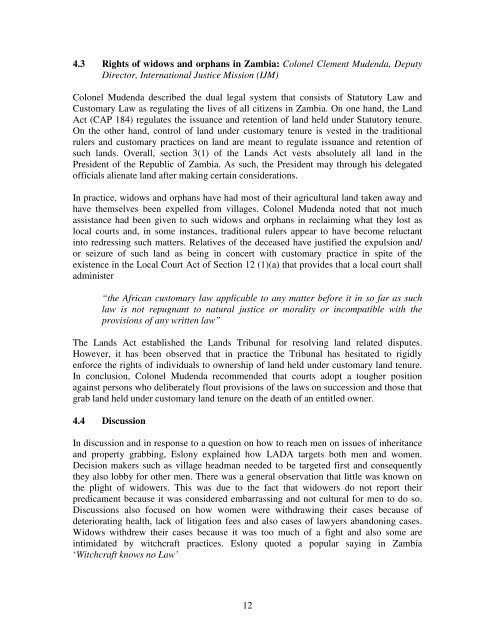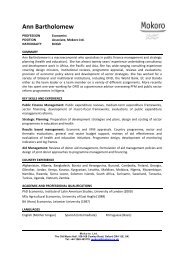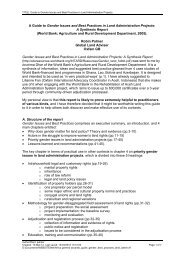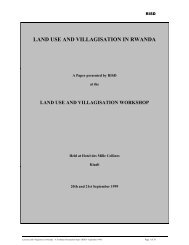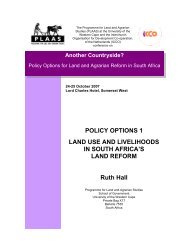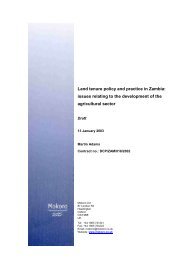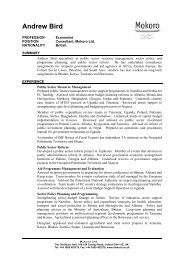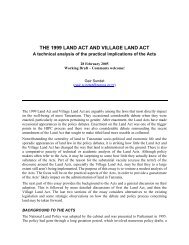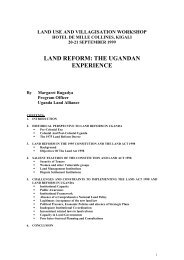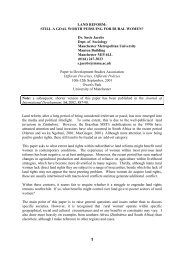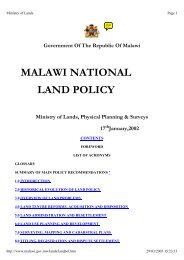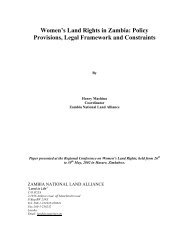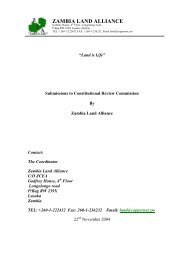Download - Mokoro
Download - Mokoro
Download - Mokoro
- No tags were found...
You also want an ePaper? Increase the reach of your titles
YUMPU automatically turns print PDFs into web optimized ePapers that Google loves.
4.3 Rights of widows and orphans in Zambia: Colonel Clement Mudenda, DeputyDirector, International Justice Mission (IJM)Colonel Mudenda described the dual legal system that consists of Statutory Law andCustomary Law as regulating the lives of all citizens in Zambia. On one hand, the LandAct (CAP 184) regulates the issuance and retention of land held under Statutory tenure.On the other hand, control of land under customary tenure is vested in the traditionalrulers and customary practices on land are meant to regulate issuance and retention ofsuch lands. Overall, section 3(1) of the Lands Act vests absolutely all land in thePresident of the Republic of Zambia. As such, the President may through his delegatedofficials alienate land after making certain considerations.In practice, widows and orphans have had most of their agricultural land taken away andhave themselves been expelled from villages. Colonel Mudenda noted that not muchassistance had been given to such widows and orphans in reclaiming what they lost aslocal courts and, in some instances, traditional rulers appear to have become reluctantinto redressing such matters. Relatives of the deceased have justified the expulsion and/or seizure of such land as being in concert with customary practice in spite of theexistence in the Local Court Act of Section 12 (1)(a) that provides that a local court shalladminister“the African customary law applicable to any matter before it in so far as suchlaw is not repugnant to natural justice or morality or incompatible with theprovisions of any written law”The Lands Act established the Lands Tribunal for resolving land related disputes.However, it has been observed that in practice the Tribunal has hesitated to rigidlyenforce the rights of individuals to ownership of land held under customary land tenure.In conclusion, Colonel Mudenda recommended that courts adopt a tougher positionagainst persons who deliberately flout provisions of the laws on succession and those thatgrab land held under customary land tenure on the death of an entitled owner.4.4 DiscussionIn discussion and in response to a question on how to reach men on issues of inheritanceand property grabbing, Eslony explained how LADA targets both men and women.Decision makers such as village headman needed to be targeted first and consequentlythey also lobby for other men. There was a general observation that little was known onthe plight of widowers. This was due to the fact that widowers do not report theirpredicament because it was considered embarrassing and not cultural for men to do so.Discussions also focused on how women were withdrawing their cases because ofdeteriorating health, lack of litigation fees and also cases of lawyers abandoning cases.Widows withdrew their cases because it was too much of a fight and also some areintimidated by witchcraft practices. Eslony quoted a popular saying in Zambia‘Witchcraft knows no Law’12


